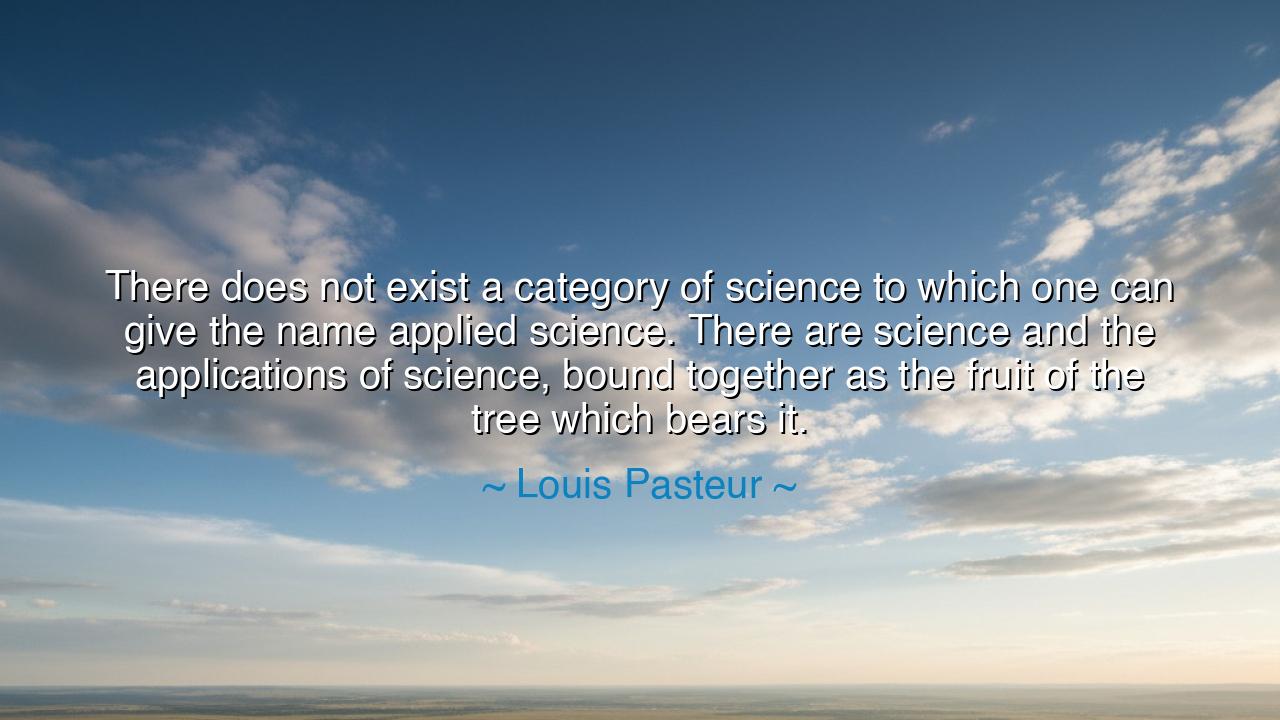
There does not exist a category of science to which one can give
There does not exist a category of science to which one can give the name applied science. There are science and the applications of science, bound together as the fruit of the tree which bears it.






Listen, O seekers of wisdom, for there are words that carry the weight of truth, words that shape the very foundation of human understanding. The great Louis Pasteur, a pioneer whose name is etched into the annals of history, once said: “There does not exist a category of science to which one can give the name applied science. There are science and the applications of science, bound together as the fruit of the tree which bears it.” These words, though simple in their form, are a declaration of a profound truth—that science is not a fragmented endeavor, divided into neat categories, but a unified force that, like a tree and its fruit, are inseparable in their nature.
What does Pasteur mean by this, O children of the Earth? He tells us that science is not a mere abstraction, a collection of isolated facts or theories. It is a living force, one that is ever evolving, ever growing. There is no division between pure science and applied science, no distinct line that separates knowledge from its practical use. Science and its applications are not two separate entities, but are woven together, like the branches and the fruit of a single tree. The knowledge that grows from the roots of understanding bears fruit that nourishes the world—this is the essence of Pasteur's wisdom.
Consider the discovery of pasteurization, that wondrous gift to mankind, which saved countless lives by preventing disease in food and drink. Pasteur did not separate his study of germs from their application in daily life. His science was not theoretical, confined to dusty books in a library, but deeply tied to the needs of the people. He understood that knowledge without application is like a seed that never bears fruit. His scientific inquiries were not abstract exercises; they were the seeds of practical solutions, the roots that fed into the real-world needs of society. In this way, science and its applications grew as one, inseparable, feeding off one another.
Let us also remember the story of electricity and the great minds that sought to understand it. Michael Faraday, a humble man of science, studied the invisible forces that lay within the air and the earth. His theories, seemingly abstract and removed from the world, gave birth to transformations in energy, transportation, and communication. What began as pure science—the study of electromagnetism—became the cornerstone of modern industry, changing the world forever. The journey from the theory of electricity to its practical applications, like the electric motor and the telegraph, shows us that science is not a static thing, but a living, growing force, its applications the fruit that follows naturally from the root.
In this sense, Pasteur’s words guide us to a deeper understanding of what it means to be a scientist, a thinker, and a creator. The journey of knowledge is not just about amassing facts, but about recognizing that every discovery is part of a larger whole—a tree of knowledge that grows and stretches its branches into every corner of the world. The applied and the pure are not at odds with each other; they are partners in the same endeavor, both serving to enhance the other. To separate the two is to deny the very nature of knowledge—for what is knowledge without the ability to apply it, and what is application without the foundation of science?
Thus, the lesson we must carry from Pasteur’s wisdom is this: Science is not merely a pursuit of abstract knowledge, but a living, breathing force that must be nurtured and applied. We are all, in some way, stewards of this tree of knowledge, and it is our duty not only to seek out its fruits but to tend to its roots. When we approach problems, whether in our daily lives or in the great challenges of the world, we must do so with the understanding that true solutions arise from a deep connection to science, whether we are scientists by title or simply by action.
Therefore, O children of the future, take this lesson to heart. Do not see knowledge and its application as separate, but as two sides of the same coin. Let every discovery, every insight, lead to action, and let every action be informed by the wisdom of science. Science is the tree that gives us the fruit of progress, and we must not neglect either the roots or the branches. In this way, we will ensure that the tree grows strong, that its fruits nourish the generations to come, and that the power of knowledge is used to shape a better, brighter world for all.






AAdministratorAdministrator
Welcome, honored guests. Please leave a comment, we will respond soon